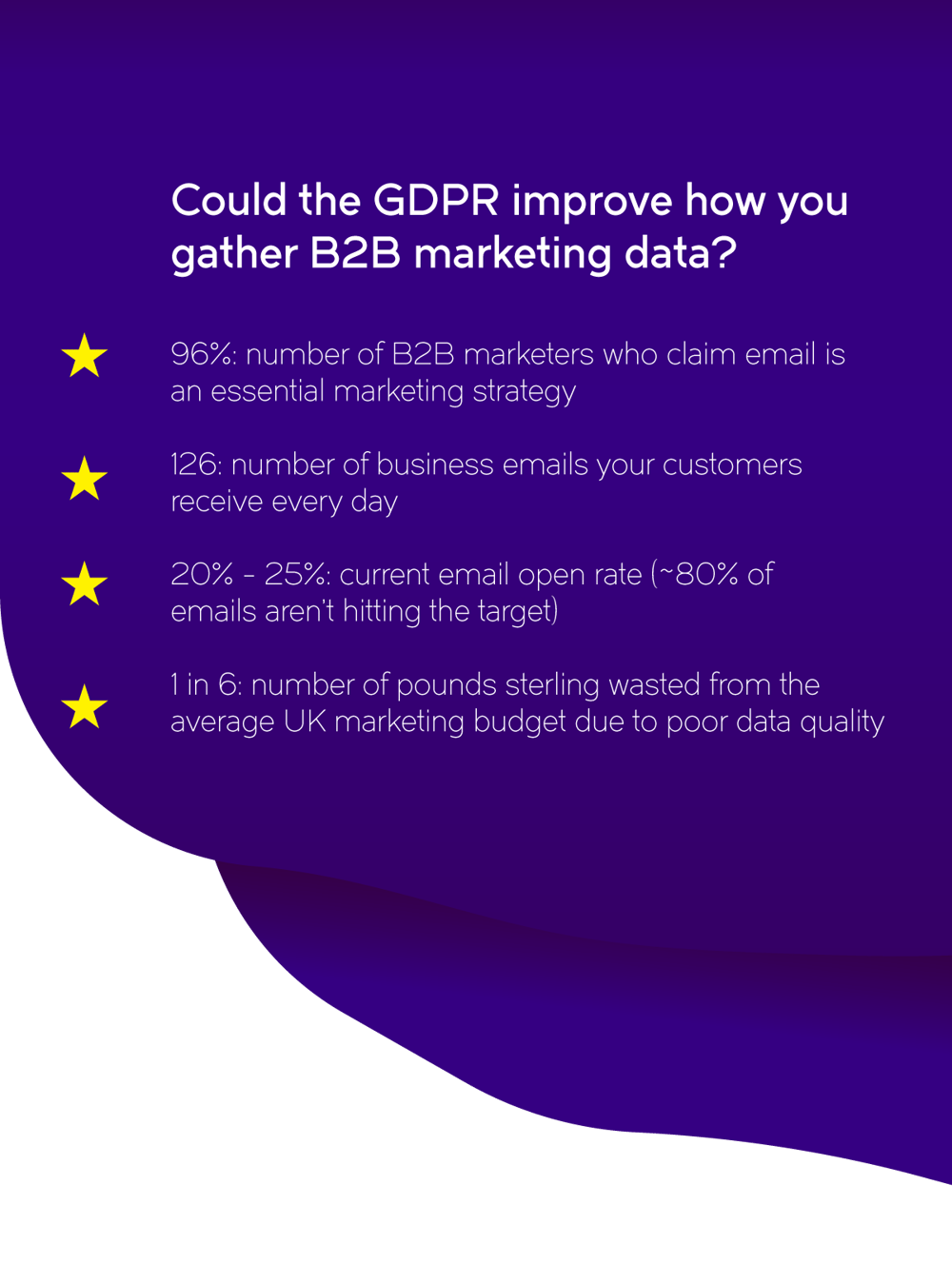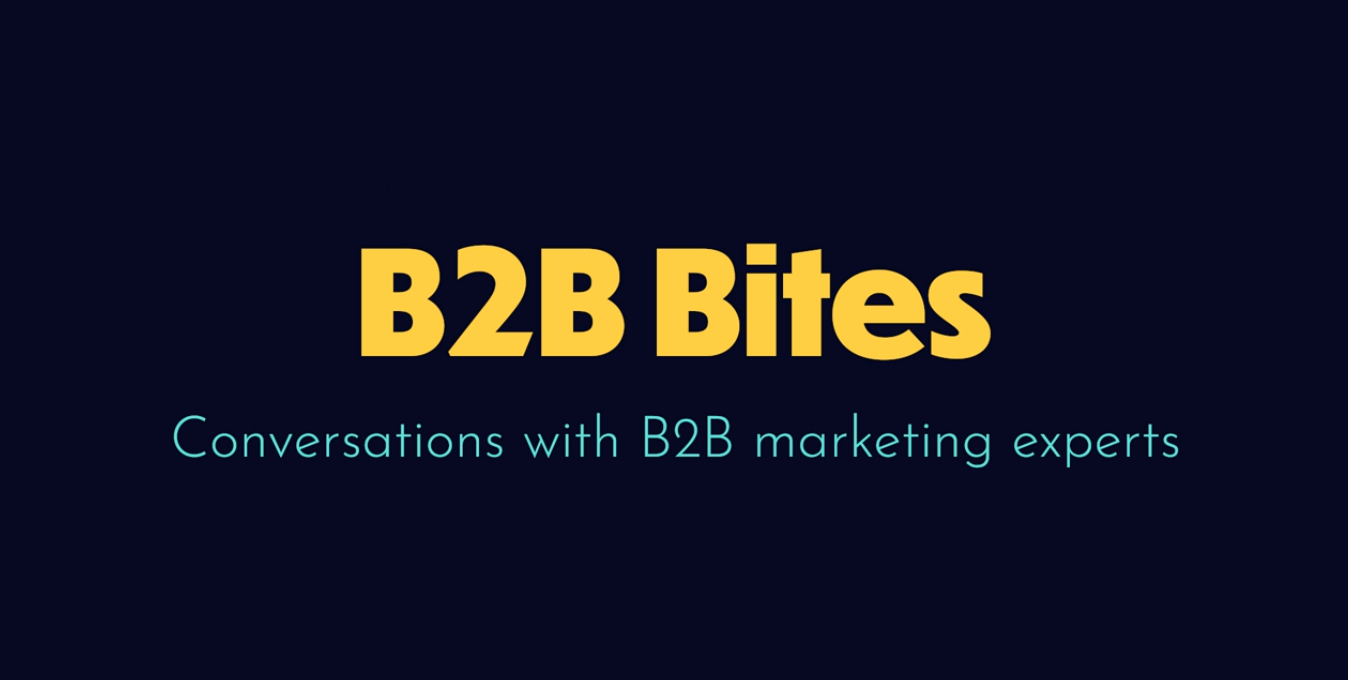The new EU Global Data Protection Regulation (GDPR) has created a number of challenges and concerns for businesses across the world. With GDPR fines reaching €20m or 4% of global turnover, those concerns are well founded. Every item of personal data is covered by GDPR – including your B2B marketing data.
There are two significant factors to consider:
- You must obtain permission from every contact before collecting, storing and processing their personal information – soft opt in registration techniques will become illegal from May 2018.
- Contacts not only have the right to opt out email marketing, but also to request that your company deletes all of their personal data.
Historically, marketing managers have been of the opinion that the more contacts they collect in their email database, the better their chances of conversion. In the past, this approach made logical sense: the more people who receive your emails, the more will click through and buy.
But the scattergun approach of mass emails (which is arguably spam) is exactly what GDPR email marketing rules are trying to prevent. Your customers already contend with 126 business emails every day, so they have little time or patience to deal with unsolicited marketing messages. Most industry sectors achieve just 20% - 25% open rates from their email marketing campaigns, suggesting that the vast majority of recipients simply aren’t interested in the messages arriving in their inboxes.

The GDPR will undoubtedly result in smaller targeted email lists – but this isn't necessarily a bad thing.
1. More accurate B2B marketing data
Ironically, just 9% of B2B marketers believe that their emails are relevant to their customers, which is crazy given that 96% claim email is important to their marketing strategy - and that email marketing is the most invested in B2B channel. A hard or soft bounce may indicate that an email address is no longer in use, but it says nothing about the customer’s interest in your message. And the same is true of the ~80% of messages that are never opened – these people are not engaged with your brand.
The GDPR provides an opportunity to begin improving the quality of data held on your systems. Setting aside existing customers (whose details can be kept on file because your relationship constitutes legitimate interest), marketing managers will need to start pruning records that are held on file 'just in case'; if they cannot prove customer opt-in, they won’t be GDPR compliant. Removing old records and building a double opt-in mailing list makes perfect sense. The remaining records belong to individuals who are actively interested in your brand, and are therefore much more likely to respond to your campaigns.
The GDPR will force businesses to refine their records, only holding on to information from genuinely interested prospects - which could be good for business overall.
Marketing and sales can then use this data to understand individual clients better, and to create personalized email marketing campaigns built on these insights. More accurate B2B marketing data assists with enhanced personalisation, in turn increasing relevance and interest for prospects.
Improving data accuracy will benefit company profitability, too. Experian QAS estimate that poor data quality is wasting £1 in every £6 spent from the average UK departmental budget.
2. Self-cleaning B2B marketing data
Ensuring a GDPR compliant email marketing database means your business will have an excellent foundation upon on which to build. A dramatic reduction in the amount of calls/emails/mailings to disinterested parties will free up time and resources for finely targeted communications and content.
Under the GDPR, the integrity of your data is much easier to maintain. New contacts should be persuaded to double opt in when signing up for your marketing communications, i.e. email newsletter. This verification clearly demonstrates interest in your brand – and signals their permission to receive your messages and content.
The GDPR also gives contacts the right to request that you delete any personal details held by your business. This is more complicated than simply adding them to a ‘do not email list’ – their information must be removed completely.
Again, this is actually good news for marketing managers. Rather than maintaining an ever-growing database populated by incomplete and disinterested records, customers help to keep information fresh by unsubscribing as their interest wanes. Data accuracy is improved by encouraging disengaged contacts to unsubscribe (assuming you cannot connect with them on a meaningful level).
Key take away: GDPR will assist compliant marketers do better database management
The time and effort invested in GDPR compliance is not wasted. Not only will their B2B marketing data be composed entirely of engaged contacts, but they can begin generating insights that help to craft content that appeals to these individuals.
__________________
[Please note: This blog is written from Squaredot’s point of view and understanding of the GDPR and changes to PECR, which is still in draft as of today’s publication date. Information herein does not replace qualified legal advice, and should not be taken as such. Please consult with legal experts or the Irish Data Protection Commission for most controversial questions.]









